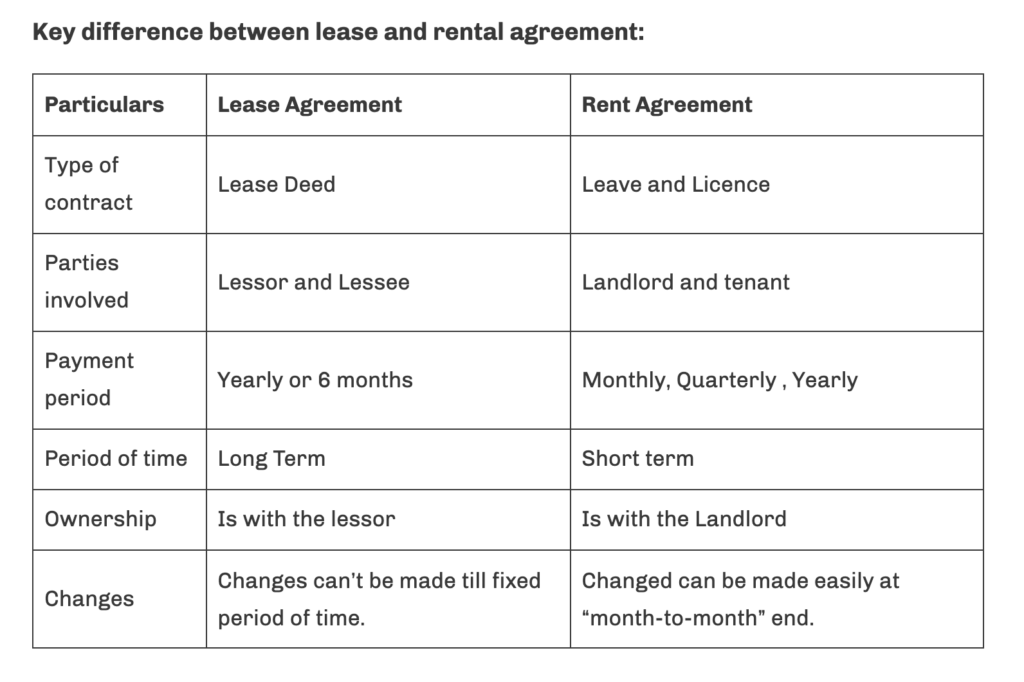If you’re looking for a new home, you’ve probably come across two terms that sound similar: “lease” and “rent.” You’ll often hear these terms used interchangeably, but they represent two distinct things when it comes to the type of legal arrangement you have with your landlord. While there are some parallels between these two types of residency, there are numerous differences that can help you decide which is best for you.
Learn the differences between renting and leasing an apartment, the advantages and disadvantages of each, and the questions you should ask yourself before choosing one over the other.
Rent vs. Lease
A lease is a contract that allows a renter to occupy a space for a set period of time, usually 12 months. A lease, on the other hand, could last from a few months to 24 months, depending on the demands of the renter and the landlord’s judgment.
On the other hand, a month-to-month rental arrangement is when a renter uses a space for a set period of time.
The difference between the terms “for lease” and “for rent”
A leased apartment is one that requires a renter to sign a lease agreement stating that they would stay for a set period of time, pay the same amount of rent each month, and provide adequate notice of their intention to leave at the conclusion of the lease agreement. Continuing the lease necessitates a new lease agreement with all new provisions, including a new rent amount, new start and end dates for the agreement, and any additional modifications to the unit since the prior lease agreement.
A rented unit is one in which a tenant can sign a contract allowing them to stay as long as they like, as long as the landlord permits it. A rental agreement includes many of the same features as a lease agreement, such as a specified period of time (such as one full month), a fixed rent amount, regulations concerning moving out early or on time, and other terms and circumstances of occupying the unit. Unless the landlord or the renter decides otherwise, a rental agreement usually renews at the end of each month.
The following are some more similarities between rent and lease:
- The agreement specifies the amount of notice and dates for moving out, such as 30, 60, or 90 days.
- The rent price remains constant unless both parties agree to change it.
Rental and leasing agreement rules and regulations differ from state to state and city to city. - The renter is responsible for maintaining the unit throughout their stay, and the agreement specifies who is responsible for any damage to the unit that occurs during the agreement.
While the legal agreement distinguishes a “for lease” rental unit from a “for rent” rental unit, landlords are more likely to use the phrase “apartment/house for rent” rather than “for lease.”
Also Read: Tips On How To Rent An Apartment Out of State
The advantages and disadvantages of leasing
Here are some reasons to lease rather than rent:
- Signing a lease gives you long-term stability for a period of time, up to two years, depending on the terms of the landlord’s lease agreement.
- Leasing a rental unit for several months allows you to personalize the space and make it feel like home.
- Even if the property’s value rises during your lease, the amount you pay in rent will not increase without your permission, and it will only change once your lease expires.
Leasing has some disadvantages, including:
- A long-term lease may not be right for every tenant, but it is ideal for those who aren’t intending on moving out in a few months.
- You must sign a new lease if you want to stay after your current lease expires.
- If you want to terminate your lease early, you must give the required notice, but you may also be required to pay fees, a percentage of the remaining rent owed, or the entire rent owed. This is entirely dependent on the landlord and the terms of the lease.
- If you vacate an apartment before the end of your lease, you are likely still liable to the landlord for rent and may face legal action.
Also Read: Question To Ask Before Renting An Apartment
The advantages and disadvantages of renting
Consider the following advantages of renting rather than leasing:
- You can leave the apartment at the end of any 30-day rental period as long as you follow the notification requirements outlined in the rental agreement.
- If you get along with your landlord and plan to stay in the unit for a long time, you might be able to work out a long-term agreement, such as a lease.
- Because your lease expires at the end of each month and only renews if you and the landlord make no changes, you’re more likely to be able to negotiate the monthly price and other terms more frequently.
- Because they’re intended for temporary rentals, some of these places may come furnished.
Consider the following disadvantages of renting:
- Because of the month-to-month lease, a landlord may ask you to vacate the apartment, pay higher rent, or impose regulations that may not be in your best interests (like as a no-pet policy) at the conclusion of the 30-day period.
- Living on a month-to-month basis may make you feel insecure about your living circumstances.
Also Read: Rental: Tips for First-Time Landlords
Which should you choose?
To evaluate if you should lease or rent a space, ask yourself the following questions:
- Would a long-term lease provide me with more security, or am I more at peace with a month-to-month deal that allows me to leave whenever I want?
- Do I want to keep my landlord as a long-term tenant?
- Do I intend to stay for a year or more? Or do I intend to stay for less than a year?
- Am I actively looking for a permanent residence, whether it’s a new rental or a home to buy?
While leasing may be the best option for you right now, you may find yourself needing to rent in the future, or vice versa. That’s why it’s critical to understand the distinction between these two phrases when looking for a new property and before signing a new lease with a landlord.
Related Articles:







